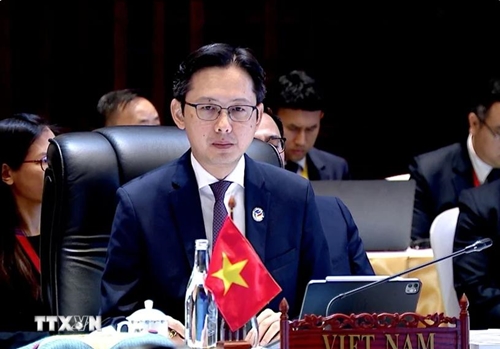The MJC 15 marked 15 years of forming the cooperation mechanism between Mekong countries and Japan. This meeting approved the Mekong-Japan cooperation strategy 2024 with cooperation orientations in the next five years.
Addressing the MJC 15, Deputy FM Viet proposed solutions to carry out three pillars of the MJC cooperation strategy for the new period. Firstly, it is necessary to promote a connected society through developing transportation and logistics networks along the East-West economic corridor and the Southern economic corridor, with focus on high-quality infrastructure projects connecting seaports, border gates, economic centers, building sustainable supply chains and supporting micro-, small- and medium-sized enterprises (MSMEs) to join the global supply chain.
    |
 |
|
Deputy Foreign Minister Do Hung Viet |
Secondly, on digitalization, focus should be made on developing digital infrastructure, quality digital human resources, supporting MSMEs in digital transformation, and applying high technology into industries.
Thirdly, effective cooperation is needed in the managing transboundary water resources, ensuring food security and energy, mitigating natural disasters and responding climate change.
At the MKC 12, Mekong countries highly valued the Republic of Korea’s commitment to gradually increasing support to the Mekong-Korea Cooperation Fund (MKCF) to reach the annual contribution of 10 million USD by 2027.
Deputy FM Viet raised several cooperation priorities in the coming time to promote cooperation potential within the MKC’s framework. The first is the promotion of green growth via mobilizing funding sources for projects on clean energy transition, carbon emissions reduction, smart agriculture, climate change response, and investment in infrastructure development, and the strengthening of cooperation between the Mekong River Commission and the Mekong-Korea Water Center.
The second is the acceleration of the digital transformation process in the Mekong subregion, together with strengthening cooperation on e-commerce, developing digital technology and implementing the Mekong-Korea Digital Forum, and the third is the development of human resources for digital transformation and green transition, projects on retraining and improving skills for the subregion's workforce.
Source: VNA